A nationwide questionnaire survey on accidental magnet ingestion in children in Japan
Funding information
This research received no specific grant from any funding agency.
Abstract
Aim
The aim is to investigate the actual situation of accidental ingestion of magnets in children in Japan and the clinical features of the resulting gastrointestinal damage.
Methods
We developed a questionnaire and sent it to 496 board-certified training hospitals nationwide. Information was collected on the number of children with accidental magnet intake from 2015 to 2017, witnesses of magnet intake, number and type of magnets, presence or absence of gastrointestinal injury, treatment, etc
Results
The number of cases of accidental ingestion of magnets within the study period was 104, with a median age of 2 years. About half of the incidents were unwitnessed. There were 33 cases of accidental ingestion of multiple magnets. Among them, oesophagogastroduodenoscopy was performed in 4 children and surgery in 10, and significantly invasive treatment was required in comparison with single-magnet ingestion. Gastrointestinal injury was observed in 11 cases, 10 of which were caused by multiple-magnet ingestion. All 10 of these patients underwent surgical treatment. There was no mortality.
Conclusion
The incidence of accidental magnet ingestion in Japan is estimated to be 50-70 per year. Unwitnessed cases are not uncommon. Multiple magnet ingestion often causes gastrointestinal injury. Many cases of gastrointestinal injury are caused by ingestion of magnetic toys.
CONFLICT OF INTEREST
The authors have no conflicts of interest to declare.




